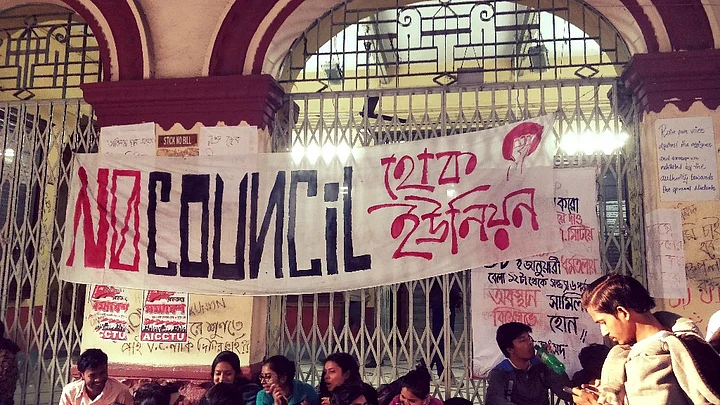On Wednesday, 17 January, students of the Jadavpur University (JU) in Kolkata gathered outside the office of the Vice-Chancellor demanding that the university conduct elections for the students’ union. This, after the Executive Council, the highest decision-making body of the university, announced on 6 January that it will uphold the mandate of the West Bengal government which had ruled in July 2017 that student unions in campuses be replaced with apolitical student councils.
The movement, which students say was on since August 2017, reached a head on Wednesday as representatives from the present union and various student bodies met the Vice-Chancellor to end the impasse.
What Is the Deal With the Students’ Council?
On 7 July 2017, the West Bengal government, after a meeting with state-aided universities, announced a decision that many said would break the backbone of student politics in the state. The government mandated that “student unions” in campuses be replaced with “student councils,” which were to be apolitical. Curbing campus violence during elections was one of the reasons given by the government while issuing the order.
The West Bengal Universities and Colleges (Composition, Functions and Procedure for Elections to Students’ Council) Rules 2017, issued by the Department of Higher Education, laid down a uniform system for elections to student bodies and took away all political and financial powers from the erstwhile ‘unions’.
The rules state that “the students’ council of colleges and universities shall not use any banner or emblem of any political party in any manner during election or campaigning” and that “every student contesting in the election shall be identified by his own name, class or section, and roll number, and nothing else.”
Elections to these councils would be held every two years, as opposed to every year. For universities, the rule change mandated that the president and two vice-presidents be nominated by the Vice-Chancellor from amongst the faculty. The general secretary, assistant general secretaries, and not more than 10 assistant secretaries would be elected by the class representatives, who would be elected directly by the students.
The new system accords the topmost positions of responsibility in the council to the teachers and not students. Moreover, it is compulsory for student members of the council to have 60 percent attendance.
What Do the Students Demand? And Why Now?
The students at the university said that they’d opposed the decision of the state government when it was first announced in 2017. The Students’ Federation of India (SFI) had held a massive protest outside the Calcutta University campus at the time.
However, activists in JU say that they were assured by the Executive Council of the university at the time that no official notification had been sent to them by the government. If and when the notification comes, the authorities said, an amicable decision would be arrived at with the consensus of the students.
On 6 January, the students were informed by the Executive Council that elections this year would be held for the students’ council and not the students’ union. This is when students restarted the protest and forced another meeting of the Executive Council on 15 January.
Our previous protests were misguided by the administration, which assured us that the state government’s decision was not final as JU was an autonomous university. Yesterday (Tuesday, 16 January), after a 33-hour-long protest outside the Vice-Chancellor’s office, which started on 15 January, the Executive Council addressed the students again, stating that the university has no say in this matter.Ranabir Islam, JU student
After discussions with the students reached an impasse on Wednesday, the Vice-Chancellor agreed to meet student representatives with the promise of facilitating a “forum of students” that would put forward its demands to the state government. There has been no official word from the university on this matter.
Students’ Speak: “Attempt to Subvert Anti-Trinamool Politics”
The protesting students said they see this as an attempt to subvert ‘anti-Trinamool’ politics in campuses across the state. They also took offence to the Chief Minister following the “Xavier’s model of student politics.”
‘We are not Xavier’s’ posters lined the area outside the Vice-Chancellor’s office.
We are not like other colleges. There is no violence that happens in JU. If violence is the concern, then the government must take specific measures to fix that in other campuses. The state government is a political body, how can they then take away politics from campuses? This is an effort to subvert ‘anti-Trinamool’ politics on campus.Debarghya, student
Other students also questioned the clause that required council member to have 60 percent attendance.
We don’t think compulsory attendance can achieve good education. It is a premise that we as a campus have always disagreed with. Education is dependent on a healthy student-teacher relationship and that cannot be forced by compulsory attendance. How can they then introduce it as a criteria to get into the students’ council?Debopom Bandyopadhyay, student
Many students also called it a political strategy before the panchayat election slated for later this year. The university authorities and the Education Ministry have not publicly addressed the students so far.
(At The Quint, we question everything. Play an active role in shaping our journalism by becoming a member today.)
